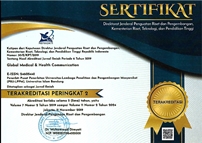Immunization Coverage and Associated Factors in Aceh Indonesia
Abstract
Few studies have looked into why global immunization coverage has plummeted, particularly in Indonesia. The Indonesian government had a childhood immunization program including in Aceh. This study aimed to learn more about immunization coverage in Aceh, Indonesia, and the factors that influence it. This cross-sectional study relied on data from the National Basic Health Surveys conducted in 2013 and 2018. The children in this study ranged in age from 12 to 23. The coverage of vaccines in Aceh fell by 50% between 2013 and 2018. (38.3% to 19.5%, the lowest in Indonesia). The number of children in Aceh who did not receive immunizations increased by 100%. (19.8% to 40.9%). While the percentage of children who have not received their complete vaccination has decreased by 5% (41.9% to 39.56%). The characteristics of the head of household with unvaccinated children were largely poor education, and the majority came from the poorest quartile of wealth. The most common reasons for refusal were families' refusal to allow immunization (43%) and fear of post-immunization fever (32%). Unvaccinated children come from low-income, low-educated families who refuse immunization.
Keywords
Full Text:
PDFReferences
Peraturan Menteri Kesehatan Republik Indonesia Nomor 12 Tahun 2017 tentang Penyelenggaraan Imunisasi.
Ahmed A, Leee K, Bukhsh A, Al-Worafi Y, Sarker MMR, Ming L, et al. Outbreak of vaccine-preventable diseases in Muslim majority countries. J Infect Public Health. 2018;11(2):153–5.
McKee C, Bohannon K. Exploring the reasons behind parental refusal of vaccines. J Pediatr Pharmacol Ther. 2016;21(2):104–9.
Smith TC. Vaccine rejection and hesitancy: a review and call to action. Open Forum Infect Dis. 2017;4(3):ofx146.
Lieu TA, Ray GT, Klein NP, Chung C, Kulldorff M. Geographic clusters in underimmunization and vaccine refusal. Pediatrics. 2015;135(2):280–9.
National Institute of Health Research and Development, Ministry of Health of Republic of Indonesia. Basic health research (Riskesdas) 2013 [Internet]. Jakarta: National Institute of Health Research and Development, Ministry of Health of Republic of Indonesia; 2013 [cited 2021 December 15]. Available from: https://labmandat.litbang.kemkes.go.id/ccount/click.php?id=10.
Kementerian Kesehatan Republik Indonesia. Riskesdas Provinsi Aceh 2013. Jakarta: Lembaga Penerbitan Badan Penelitian dan Pengembangan Kesehatan, Kementerian Kesehatan Republik Indonesia; 2013.
Badan Penelitian dan Pengembangan Kesehatan, Kementerian Kesehatan Republik Indonesia. Laporan Nasional Riskesdas 2018. Jakarta: Lembaga Penerbit Badan Penelitian dan Pengembangan Kesehatan; 2019.
Badan Penelitian dan Pengembangan Kesehatan, Kementerian Kesehatan Republik Indonesia. Laporan Provinsi Aceh Riskesdas 2018. Jakarta: Lembaga Penerbit Badan Penelitian dan Pengembangan Kesehatan; 2019.
Barbacariu CL. Parents’ refusal to vaccinate their children: an increasing social phenomenon which threatens public health. Procedia Soc Behav Sci. 2014;149:84–91.
Thaib TM, Darussalam D, Yusuf S, Andid R. Cakupan imunisasi dasar anak usia 1–5 tahun dan beberapa faktor yang berhubungan di Poliklinik Anak Rumah Sakit Ibu dan Anak (RSIA) Banda Aceh. Sari Pediatri. 2013;14(5):283–7.
Suryawati I, Bakhtiar, Abdullah A. Cakupan imunisasi dasar anak ditinjau dari pendekatan health belief model. JIK. 2016;4(1):114–25.
Etana B, Deressa W. Factors associated with complete immunization coverage in children aged 12–23 months in Ambo Woreda, Central Ethiopia. BMC Public Health. 2012;12:566.
Williams SE. What are the factors that contribute to parental vaccine-hesitancy and what can we do about it? Hum Vaccin Immunother. 2014;10(9):2584–96.
Marlina, Usman S, Marzuki. Faktor kelengkapan imunisasi dasar pada bayi di Puskesmas Sawang Kabupaten Aceh Utara. Jukema. 2017;3(1):212–8.
Yufika A, Wagner AL, Nawawi Y, Wahyuniati N, Anwar S, Yusri F, et al. Parents’ hesitancy towards vaccination in Indonesia: a cross-sectional study in Indonesia. Vaccine. 2020;38(11):2592–9.
Harapan H, Anwar S, Setiawan AM, Sasmono RT; Aceh Dengue Study. Dengue vaccine acceptance and associated factors in Indonesia: a community-based cross-sectional survey in Aceh. Vaccine. 2016;34(32):3670–5.
Esposito S, Principi N, Cornaglia G; ESCMID Vaccine Study Group (EVASG). Barriers to the vaccination of children and adolescents and possible solutions. Clin Microbiol Infect. 2014;20( Suppl 5):25–31.
Dyer O. Philippines measles outbreak is deadliest yet as vaccine scepticism spurs disease comeback. BMJ. 2019;364:l739.
Ochani RK, Yasmin F, Tariq A, Shaikh A. Philippines hit by deadly measles outbreak – a wakeup call? Infez Med. 2019;27(3):353–4.
DOI: https://doi.org/10.29313/gmhc.v10i1.8961
pISSN 2301-9123 | eISSN 2460-5441
Visitor since 19 October 2016:
Global Medical and Health Communication is licensed under a Creative Commons Attribution-NonCommercial-ShareAlike 4.0 International License.






























.png)
_(1).png)
_(1).jpg)
